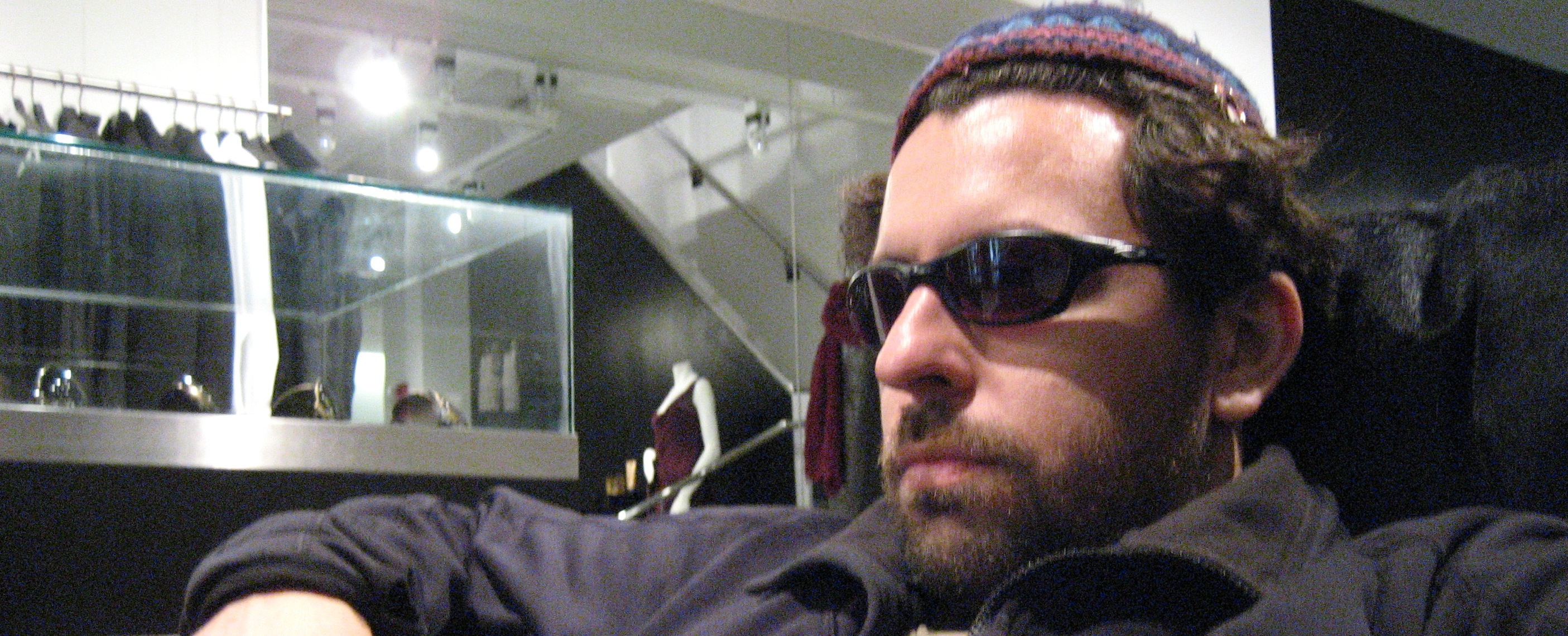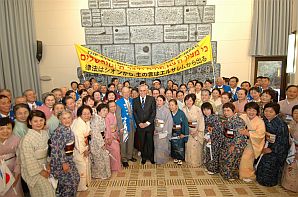The Japanese connection
The Makuya stick with Israel through thick and thin.
click here for original posting
By Amihai Zippor
For many members of the Japanese Makuya sect who participated in their 53rd annual pilgrimage to Israel this past week, the fact that it literally rained on their Jerusalem parade didn’t dampen their spirits one bit. The Makuya made their presence felt in Israel’s capital by singing to Jerusalemites in the street and mesmerizing them with a Zionist idealism that many Jews believe needs to be rekindled by their own.
“Your ideology was born in the year the State of Israel was established, and since then you and Israel have walked step by step together,” Jerusalem Mayor Uri Lupolianski told nearly 300 members of the group at a special gathering at City Hall. “With mutual love and friendship, the citizens of Jerusalem continually bestow upon you their outward respect and special relationship,” the mayor said, joining in as the Makuya sang traditional Jewish songs.
Founded in 1948 by Prof. Abraham Ikro Tishma, the Makuya’s beliefs are rooted in Judaism’s ancient writings and they profess faith in the prophecies of the Hebrew Bible. They do not consider themselves Jewish, but share a common practice with those associated with the Bnei Noah movement, Gentiles who observe the seven specific laws God gave to the world in the early chapters of the Book of Genesis. Though lending support to Israel isn’t one of those commandments, the Makuya makes helping the Jewish People one of its top priorities.
When the Six Day War broke out, Tishima told the few Makuya to stay in Israel “as long as they deemed it safe.” After it was discovered how easily the IDF overtook its enemies, unifying Jerusalem and regaining access to the Old City, he immediately flew to Israel to visit the Temple Mount and its environs, later saying the experience was one of the “greatest days” of his life. “I cannot bear to see one nation after another desert Israel for the sake of oil and besides, I don’t want to see Japan become the laughing stock of the world,” Tishma declared during Japan’s first pro-Israel rally, following the Yom Kippur War in 1973.
As the Arab world was pressuring his country to boycott the Jewish state or face the continued threat of the 1970s oil embargo, he told his people “Japan will not receive honor and self respect in exchange for temporary and material gains.” “Someone should stand up and defend Israel,” Tishma said.
Chanting common Jewish songs and waving Israeli flags through the streets of Tokyo, their effort to reach a very indifferent Japanese public made headlines across the Jewish world, and a special bond blossomed between the two peoples. The publicity, and Tishima’s diligent calls for his followers to forge ties with Judaism and to work the Land of Israel like true Zionist pioneers, was a catalyst for Israel’s embrace of the Makuya.
Since then, hundreds of members have come to Israel to either learn Hebrew and biblical history at Kibbutz Heftziba in the North, or live at the Makuya Jerusalem headquarters and take classes in biblical study at the Hebrew University. The group has also contributed tens of thousands of dollars to the Jewish National Fund to plant forests across the country and is involved with many other environmental projects. Tishima himself gave $30,000 to the organization and had an idea to establish Japanese gardens in Israel both as a symbol of Japanese culture and also as a way of settling and beautifying the land. One of their more recent projects is funding the rehabilitation of forests burnt due to Hizbullah’s Katyusha rocket attacks during last summer’s war in Lebanon. Though his passing in late December 1973 was an immense loss for the Makuya, Tishima’s legacy lived on as the group continued to be recognized for their accomplishments through high-level meetings with Israeli presidents, prominent rabbis and other religious figures.
In 1996, more than 1600 Makuya came to celebrate the 3,000th anniversary of the founding of Jerusalem as Israel’s eternal capital and met with then Mayor Teddy Kollek. This year’s pilgrimage, also one of the biggest, was in commemoration of the 40th year since Jerusalem was reunified. Members performed Wednesday night with the Jerusalem Symphony Orchestra in a program that combined Japanese, European and Israeli music, and the warm meeting with Lupolianski and their parade throughthe city were everything the group could have asked for.
“Jerusalem is the pinnacle of the Holy Land; it’s where everything comes together,” explained young Japanese-born, Alaskan resident Nori Yasu, who made the pilgrimage via Japan. “I could truly feel something when we traveled [around] Israel but when we came here, it summed it all up,” he said as he joined the group for the procession through the downtown area, several days prior to the concert. At the time, pedestrians and store owners watched as the Makuya danced and sang their way from Jaffa Road to the Mashbir on Rehov King George. Many came out to greet them, as the festive energy took attention away from the drizzle and cold.
“It’s just thrilling, very exciting to see them here,” said Dani, an Israeli teenager surprised by their enthusiasm. “I think it’s amazing that they are people who are not Jewish, coming here to celebrate their Zionism and the beauty and holiness of the land.” Ilan, a shopkeeper on Rehov Ben-Yehuda, said he’s lived in Jerusalem for 50 years and always enjoys their visits. “They could teach a thing or two to the people in this country,” he said. However, the Makuya were not here to criticize, but to return some of the inspiration and courage they feel they have gained from the Jewish People. As Lupolianski concluded, the Jewish people is small, but it should be so lucky to have more friends in the world like the Makuya.



